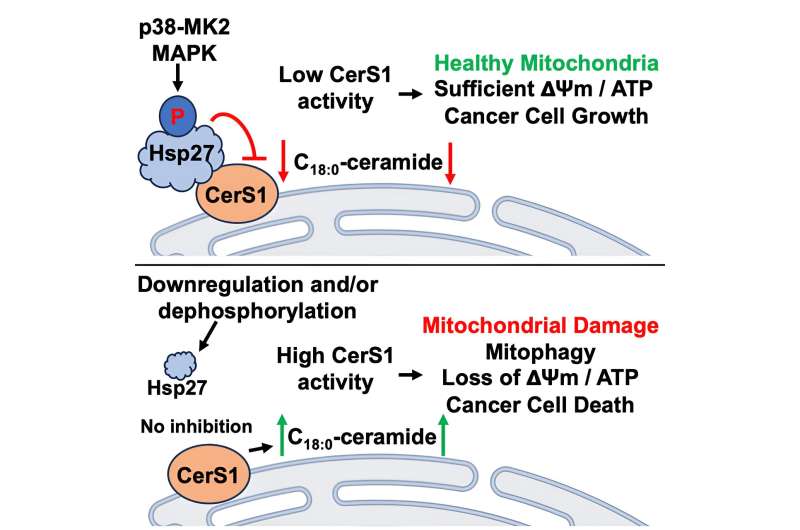This article has been reviewed according to Science X's editorial process and policies. Editors have highlighted the following attributes while ensuring the content's credibility:
fact-checked
peer-reviewed publication
trusted source
proofread
Blocking proteins could pull the plug on power for colon tumors

Through study findings published in Cell Reports, a team of scientists at VCU Massey Cancer Center has discovered a previously unknown interaction between proteins that is responsible for supplying energy to tumor cells and could hold significant implications for the development of future treatments for colon cancer.
"This study is really exciting because we may be able to use these findings to inform the development of an entirely new cancer drug right here at Massey," said study author Can Senkal, Ph.D., a member of the Cancer Biology research program at Massey and an assistant professor in the Department of Biochemistry and Molecular Biology at the VCU School of Medicine.
The potential answer lies within a class of fatty compounds known as ceramides. Ceramides regulate a number of vital cellular functions, and many cancer drugs stimulate ceramide generation to help fend off disease. When that production of ceramide is cut off, cancer cells can survive and grow more efficiently.
Senkal and his team began extensively screening cells in the lab to identify what proteins regularly interact with ceramide-producing proteins to identify potential patterns that could warrant further investigation.
Ceramide synthases—the enzymes responsible for the generation of ceramide—come in a variety pack of six different flavors: Ceramide synthase 1-6.
Through their research, Senkal's team observed that the first flavor, ceramide synthase 1 (CerS1), was highly interactive with a particular protein known as heat shock protein 27 (Hsp27). Heat shock proteins act like chaperones for other proteins to retain their full function; however, an overabundance of them can tip the scales and prevent ceramide synthases from doing their job.
The researchers also noticed that Hsp27 activity was higher in many colon cancer cells while at the same time CerS1 activity was significantly lower, prompting Senkal and his team to consider whether the absence of one was connected to the presence of the other.
"There is this yin-yang kind of relationship, which gave us the idea to follow it," Senkal said. "Hsp27 is like the bad guy holding back the good guy, CerS1."
Through the study, they identified a specific biological mechanism through which Hsp27 interacted with and inhibited the function of CerS1 in colon cancer cells. By deliberately blocking the activity of Hsp27 in these cells, the researchers confirmed the decreased presence of Hsp27 led to a heightened reactivation of CerS1, which in turn forced a reduction in mitochondrial function.
"Cancer cells rely on mitochondria to have the energy to multiply. Without it, the cancer cells can no longer sustain the amount of energy they need and die," Senkal said.
By blocking the function of these heat shock proteins, they were essentially able to reactivate the cellular hand that could pull the plug on the power source connected to the cancer, Senkal said.
This revelation led the study authors to suggest that Hsp27 could be a primary target in the creation of novel therapies for colon cancer.
"We can really go after these protein-protein interactions and precisely reactivate certain enzymes while we don't touch others," Senkal said.
These findings are the result of a decade's worth of research by Senkal and his team, in an area which he noted isn't really being explored by anyone else.
Senkal knows this won't be an overnight achievement, but hopes to collaborate with other scientists at Massey in a long-term effort to apply these findings to in-house novel drug development at the cancer center.
Although this study showed encouraging results in colon cancer, they hope to broaden the scope of this research to additional solid tumors in which the overexpression of Hsp27 has been observed, including lung, pancreatic and prostate cancers.
"We hope to demonstrate this connection in other tumors as well, which might better represent the patient population in Massey's catchment area," Senkal said.
Collaborators on this study include Rowan Boyd, Sachin Kempelingaiah, Saurav Majumder, Ph.D., Grace Mavodza, Ph.D., Johnny Stiban, Ph.D. and Alexandra Straus of the VCU School of Medicine; and Yusuf Hannun, M.D., Lina Obeid, M.D., and Varun Reddy of Stony Brook University.
More information: Rowan A. Boyd et al, The heat shock protein Hsp27 controls mitochondrial function by modulating ceramide generation, Cell Reports (2023). DOI: 10.1016/j.celrep.2023.113081




















